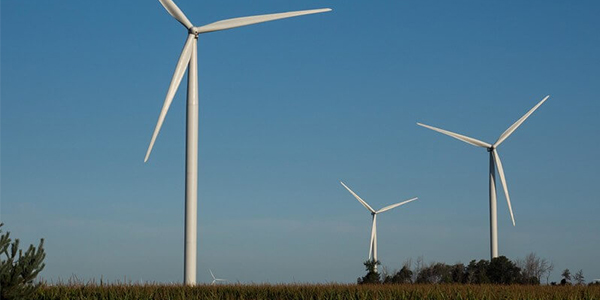By Amanda Durish Cook
DTE Energy’s earnings fell last quarter despite gains for its electric business, the company said Monday during a call highlighting its recent push to reach zero carbon emissions by 2050.
The company reported third-quarter profits of $319 million ($1.73/share) compared with the $334 million ($1.84/share) a year earlier. Operating income fell 9 cents short of Zacks’ estimates of $2/share. DTE attributed the decline to expenses related to restoration activities after severe storms.
Despite the performance, DTE increased its 2019 operating earnings guidance range from $6.02-$6.38/share to $6.06-$6.40/share.
Speaking to analysts on an Oct. 28 earnings call, CEO Jerry Norcia said 2019 “is shaping up to be a strong year as evidenced by our guidance increase.”
Chief Financial Officer Peter Oleksiak said DTE’s standalone electric earnings were $307 million for the quarter, $3 million higher than 2018, “largely due to the impact of new rates implemented in May, offset by rate base growth costs and cooler weather in 2019.”
“As a reminder, the third quarter of 2018 was one of the hottest quarters on record in our region,” Oleksiak said.
The call also focused on DTE’s recent decarbonization goal.
The company last month announced it was setting a “bold new goal” of net zero carbon emissions in its electric generation fleet by 2050. The utility had previously committed to reducing greenhouse gas emissions from electric generation by 50% from 2005 levels by 2030, 75% by 2040 and 80% by 2050.
“DTE Electric’s medium- and long-term plans aligned with the scientific consensus around the importance of achieving carbon emission reductions. We are fully committed to dramatically reduce carbon emissions. This is the right thing to do for our customers, our business and the environment. We are doing as much as we can, as fast as we can, to provide our customers and the state of Michigan with clean energy that is affordable and reliable,” Norcia said.
DTE says reaching zero emissions will depend on retirement of its coal fleet, “thousands” of additional wind and solar megawatts, natural gas-fired generation and investments in carbon capture, large-scale storage and modular nuclear facilities.
The announcement comes as the Michigan Public Service Commission deliberates on DTE’s latest 15-year integrated resource plan, filed in spring. Environmentalists and renewable advocates have derided the plan as relying blindly on coal and natural gas resources and not including enough renewable energy. Multiple intervenors have urged the PSC to reject the plan. (See DTE IRP Draws Fire from Renewable Proponents.)
Norcia said progress continues on the $1 billion, 1,150-MW gas-fired Blue Water Energy Center to replace about 2,000 MW of retiring coal plants in southwestern Michigan.
“We broke ground last year and received all the necessary permits. The plant is a little over 30% complete with the turbines already on site and an expected in-service date of the spring of 2022,” Norcia said.
Norcia also reported progress on MIGreenPower, the company’s voluntary renewable energy program, saying commercial customers including Ford, General Motors, the University of Michigan and the Detroit Zoo have committed to using a combined 400 MWs of renewable power to date. Additionally, nearly 10,000 residential customers have “committed to a portion of their monthly bills [going] to renewable power,” he said.
DTE also reported the Michigan PSC last quarter conditionally approved its purchase of three new wind farms with a collective 455 MW in capacity, increasing the company’s renewables portfolio by nearly 50%. The wind farms are slated to come online at the end of 2020.






